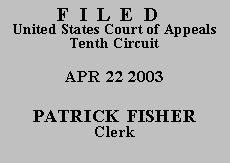

| UNITED STATES OF AMERICA,
Plaintiff - Appellee, Defendant - Appellant. |
No. 02-5125
(D.C. No. 02-CR-37-P) |
In reviewing the denial of a motion to suppress evidence, we accept the district court's findings of fact unless they are clearly erroneous, viewing the evidence in the light most favorable to the government. United States v. Zubia-Melendez, 263 F.3d 1155, 1159 (10th Cir. 2001). We review de novo the ultimate determination of reasonableness under the Fourth Amendment. United States v. Horn, 970 F.2d 728, 730 (10th Cir. 1992).
The Fourth Amendment protects against unreasonable searches and seizures. A traffic stop constitutes a "seizure" within the meaning of the Fourth Amendment. United States v. Walker, 933 F.2d 812, 815 (10th Cir. 1991). Such a stop "is valid under the Fourth Amendment if the stop is based on an observed traffic violation . . . ." United States v. Botero-Ospina, 71 F.3d 783, 787 (10th Cir. 1995). In this case, the district court found that Trooper King stopped Mr. Ramos-Rivera's vehicle for failure to signal to change lanes when exiting the turnpike. Mr. Ramos-Rivera does not contend the traffic stop was illegal.
After requesting a valid driver's license and proof of entitlement to operate the vehicle, running a computer check, and issuing a citation, an officer must allow the driver to proceed without further delay or questioning unless "during the course of the traffic stop the officer acquires an objectively reasonable and articulable suspicion that the driver is engaged in illegal activity" or "the driver voluntarily consents to the officer's additional questioning." United States v. Sandoval, 29 F.3d 537, 540 (10th Cir. 1994). An encounter can only become consensual under this latter exception after the officer has the returned the driver's documents. United States v. Gonzalez-Lerma, 14 F.3d 1479, 1483 (10th Cir. 1994). The officer determines whether there is an objectively reasonable suspicion of illegal activity based on the totality of the circumstances. United States v. Soto, 988 F.2d 1548, 1555 (10th Cir. 1993). Deference is given to the officer's ability to determine whether activities are suspicious. United States v. Lopez-Martinez, 25 F.3d 1481, 1484 (10th Cir. 1994).
In this case, the district court found that Trooper King had an "objectively reasonable articulable suspicion" that illegal activity had occurred or was occurring and was therefore justified in questioning Mr. Ramos-Rivera further. The officer's suspicion was based on Mr. Ramos-Rivera's extreme nervousness even after the officer made clear he was not going to issue a ticket, the conflicting stories given by Mr. Ramos-Rivera and his passenger, no proof of car ownership, and the oddity of the spare tire being in the back seat. We have reviewed the record and we are not persuaded the district erred in determining further questioning of Mr. Ramos-Rivera was justified.
Mr. Ramos-Rivera also contends that he did not thereafter consent to the search of his vehicle. When a defendant alleges he did not voluntarily consent to a search, the government bears the burden of proving consent was in fact voluntary. United States v. Sanchez-Valderuten, 11 F.3d 985, 990 (10th Cir. 1993). The district court found that Trooper King twice obtained oral permission from Mr. Ramos-Rivera to search the vehicle, including one instance of a physical demonstration of that permission. Whether consent is freely and voluntarily given is a question of fact determined from the totality of the circumstances. United States v. Pena, 143 F.3d 1363, 1366 (10th Cir. 1998). The government must show the consent was unequivocal and specific and freely given without express or implied duress or coercion. United States v. Angulo-Fernandez, 53 F.3d 1177, 1180 (10th Cir. 1995). The district court found, and defense counsel conceded, that there was no attempt at coercion and that Trooper King was polite to Mr. Ramos-Rivera. Furthermore, the court found that Mr. Ramos-Rivera's documents had at that point been returned to him.
The real question here is Mr. Ramos-Rivera's ability to understand the English language sufficiently to give valid consent to the search of his vehicle. Mr. Ramos-Rivera contends the fact that he was Mirandized in Spanish indicates his understanding of English was insufficient to understand Trooper King's questions regarding whether he consented to a search. The district court cited the standards for comprehension of English from United States v. Zapata, 180 F.3d 1237, 1242 (11th Cir. 1999), and found based on its review of the videotape of the encounter that Mr. Ramos-Rivera understood Trooper King's questions and understood that he would be issued a warning. The district court found that in the course of the conversation there was only one question Mr. Ramos-Rivera did not understand, and that related to the relationship between Mr. Ramos-Rivera and his uncle. Considering the totality of the circumstances, the court found that Mr. Ramos-Rivera's comprehension of English was sufficient to give valid consent to the search of the vehicle. We find no clear error in this factual finding. Consequently, we hold that consent to the search of the vehicle was valid.
Trooper King acted consistently with the requirements of the Fourth Amendment, and the district court was therefore correct in denying the motion to suppress evidence obtained by searching Mr. Ramos-Rivera's vehicle. Accordingly, we AFFIRM.
ENTERED FOR THE COURT
Stephanie K. Seymour
Circuit Judge
*.After examining appellant's brief and the appellate record, this panel has determined unanimously that oral argument would not materially assist the determination of this appeal. See Fed. R. App. P. 34(a)(2) and 10th Cir. R. 34.1(G). The case is therefore submitted without oral argument. This order and judgment is not binding precedent, except under the doctrines of law of the case, res judicata, or collateral estoppel. The court generally disfavors the citation of orders and judgments; nevertheless, an order and judgment may be cited under the terms and conditions of 10th Cir. R. 36.3.